|
|
|
Sort Order |
|
|
|
Items / Page
|
|
|
|
|
|
|
| Srl | Item |
| 1 |
ID:
085002
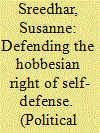

|
|
|
|
|
| Publication |
2008.
|
| Summary/Abstract |
A well-known part of Hobbes's political theory is his discussion of the inalienability of the right of self-defense. In this article, I present and defend a reinterpretation of Hobbes's account of self-defense. I begin by showing the weaknesses of the standard interpretation of this account: It rests on an implausible thesis about the evil of death; it renders Hobbes's applications of the right of self-defense inexplicable; and it conflicts with Hobbes's claim that there are cases in which the right of self-defense can be given up. I argue that we should understand Hobbes's claim to be that the right of self-defense is inalienable only in the social contract, and I offer a new interpretation of how his argument on this point might go.
|
|
|
|
|
|
|
|
|
|
|
|
|
|
|
|
| 2 |
ID:
085337
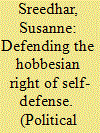

|
|
|
|
|
| Publication |
2008.
|
| Summary/Abstract |
A well-known part of Hobbes's political theory is his discussion of the inalienability of the right of self-defense. In this article, I present and defend a reinterpretation of Hobbes's account of self-defense. I begin by showing the weaknesses of the standard interpretation of this account: It rests on an implausible thesis about the evil of death; it renders Hobbes's applications of the right of self-defense inexplicable; and it conflicts with Hobbes's claim that there are cases in which the right of self-defense can be given up. I argue that we should understand Hobbes's claim to be that the right of self-defense is inalienable only in the social contract, and I offer a new interpretation of how his argument on this point might go.
|
|
|
|
|
|
|
|
|
|
|
|
|
|
|
|
| 3 |
ID:
085339
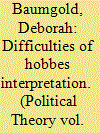

|
|
|
|
|
| Publication |
2008.
|
| Summary/Abstract |
Idiosyncrasies of Hobbes's composition process, together with a paucity of reliable autobiographical materials and the norms of seventeenth-century manuscript production, render interpretation of his political theory particularly difficult and contentious. These difficulties are surveyed here under three headings: (1) the process of "serial" composition (meaning the production of multiple, often expanded, versions of a work), which was common in the period; (2) the relationship between Hobbes's three political-theory texts- the Elements of Law, De Cive, and Leviathan, which is basic to defining the textual embodiment of his theory, and controversial; and (3) his method of writing. I argue that Hobbes's composition process undercut his intention to produce a deductive, logical theory of politics and opened the door to inconsistency and muddle in his arguments.
|
|
|
|
|
|
|
|
|
|
|
|
|
|
|
|
| 4 |
ID:
085004
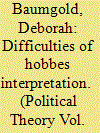

|
|
|
|
|
| Publication |
2008.
|
| Summary/Abstract |
Idiosyncrasies of Hobbes's composition process, together with a paucity of reliable autobiographical materials and the norms of seventeenth-century manuscript production, render interpretation of his political theory particularly difficult and contentious. These difficulties are surveyed here under three headings: (1) the process of "serial" composition (meaning the production of multiple, often expanded, versions of a work), which was common in the period; (2) the relationship between Hobbes's three political-theory texts- the Elements of Law, De Cive, and Leviathan, which is basic to defining the textual embodiment of his theory, and controversial; and (3) his method of writing. I argue that Hobbes's composition process undercut his intention to produce a deductive, logical theory of politics and opened the door to inconsistency and muddle in his arguments.
|
|
|
|
|
|
|
|
|
|
|
|
|
|
|
|
| 5 |
ID:
085003
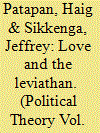

|
|
|
|
|
| Publication |
2008.
|
| Summary/Abstract |
Hobbes's understanding of love, and its significance for his political thought, has received insufficient attention. This essay contends that Hobbes has a consistent and comprehensive teaching on love that directly repudiates what he regards as the Platonic teaching on eros. In attacking the Platonic idea of eros, Hobbes undermines a pillar of classical political philosophy and articulates a significant aspect of his new understanding of the passions in terms of power, which is itself a critical part of his new political science most famously presented in Leviathan
|
|
|
|
|
|
|
|
|
|
|
|
|
|
|
|
| 6 |
ID:
085338
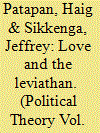

|
|
|
|
|
| Publication |
2008.
|
| Summary/Abstract |
Hobbes's understanding of love, and its significance for his political thought, has received insufficient attention. This essay contends that Hobbes has a consistent and comprehensive teaching on love that directly repudiates what he regards as the Platonic teaching on eros. In attacking the Platonic idea of eros, Hobbes undermines a pillar of classical political philosophy and articulates a significant aspect of his new understanding of the passions in terms of power, which is itself a critical part of his new political science most famously presented in Leviathan.
|
|
|
|
|
|
|
|
|
|
|
|
|
|
|
|
| 7 |
ID:
085340
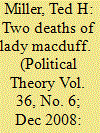

|
|
|
|
|
| Publication |
2008.
|
| Summary/Abstract |
Stephen White and Gianni Vattimo have argued in favor of weak ontological thought. Particularly for White, weak ontology's contestable fundamentals are a superior response to strong ontologies, including the violence linked to them. I make a historically comparative evaluation of their arguments. The evaluation draws on William Davenant's Restoration revision of Shakespeare's Macbeth. Davenant's play defends Charles II's sovereignty against the strong ontological claims of orthodox Anglicans. Lady Macduff's much expanded role and the death she suffers, in contrast to her counterpart in Shakespeare's Folio, are key vehicles for this defense. Davenant's revisions are linked in this interpretation to Charles II's Happy Act of Indemnity and Oblivion of 1660. Also explored are new connections between Macduff and the witches. I argue Davenant exemplifies a contingency unanticipated by weak ontology advocates: he is both antifoundational and in favor of violence. Antifoundational arguments aid more political persuasions than often imagined.
|
|
|
|
|
|
|
|
|
|
|
|
|
|
|
|
| 8 |
ID:
085005


|
|
|
|
|
| Publication |
2008.
|
| Summary/Abstract |
Stephen White and Gianni Vattimo have argued in favor of weak ontological thought. Particularly for White, weak ontology's contestable fundamentals are a superior response to strong ontologies, including the violence linked to them. I make a historically comparative evaluation of their arguments. The evaluation draws on William Davenant's Restoration revision of Shakespeare's Macbeth. Davenant's play defends Charles II's sovereignty against the strong ontological claims of orthodox Anglicans. Lady Macduff's much expanded role and the death she suffers, in contrast to her counterpart in Shakespeare's Folio, are key vehicles for this defense. Davenant's revisions are linked in this interpretation to Charles II's Happy Act of Indemnity and Oblivion of 1660. Also explored are new connections between Macduff and the witches. I argue Davenant exemplifies a contingency unanticipated by weak ontology advocates: he is both antifoundational and in favor of violence. Antifoundational arguments aid more political persuasions than often imagined.
|
|
|
|
|
|
|
|
|
|
|
|
|
|
|
|
|
|
|
|
|